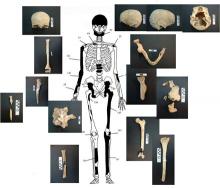Alexander
Ancient bone mix-up: Is the real King Philip II being kept in a uni cupboard?
King Philip II of Macedon – a general extraordinaire – who transformed Greece into the dominant military power in the Balkans, paving his way for his son Alexander the Great to conquer the known world, was assassinated in 336 BC. His tomb was found in pristine condition in 1977 with the “Vergina Sun” – the symbol etched on his old coffin becoming the emblem of Macedonia.
Vergina skeletal remains match those of King Philip II of Macedon (pics)
Experts confirmed that the skeletal remains found in a tomb in Vergina, northern Greece, belong to King Philip II of Macedon, Alexander the Great’s father. The royal father suffered a leg wound that left him crippled three years before his assassination in 336 BC. New research found evidence of his injury and signs of lameness in the skeletal remains.
Patriarch supports ancient site of Philippoi’s cultural heritage bid
Ecumenical Patriarch Bartholomew arrived at Kavala on Friday for a three-day official visit to Serres and Nigrita, northern Greece.
Mystery deepens over ancient Greek tomb at Amphipolis
By Costas Kantouris
A geologist who took part in the excavation of the ancient burial mound in Amphipolis in northern Greece says the ancient tomb found together with a series of vaulted rooms wasn't built at the same time, but somewhat later than the rooms themselves.
CNN praises Aigai for its mystery and cultural history
A big report on CNN’s Travel section on ten UNESCO sites which are characterized by mystery and intrigue has been published, stirring interest from readers all over.
Remains of five people found in Greek tomb
Bones from at least five people, including a baby and an elderly woman, were identified in a massive tomb in Greece dating back to the era of Alexander the Great, the culture ministry said on Jan. 19.
- Read more about Remains of five people found in Greek tomb
- Log in to post comments
Five individuals in Amphipolis tomb
Experts examining the findings at an Alexander the Great-era tomb near Amphipolis in the Macedonian region of northern Greece have identified bones from at least five people, the Culture Ministry said Monday.
- Read more about Five individuals in Amphipolis tomb
- Log in to post comments
Ministry rebuffs reports that Amphipolis skeleton has been identified
The Greek Culture Ministry on Friday denied press reports according to which the human remains discovered in an excavation at the site of Ancient Amphipolis in northern Greece have been identified, referring to «groundless 'information' and speculation."
Scientists expand excavation of ancient Amphipolis
By Costas Kantouris
Scientists have opened the second phase of their excavation of the vast 4th-century BC burial mound in Amphipolis town in search of more tombs and bodies.
The first search of the site, which was built shortly after Alexander the Great's death, discovered and dug up a tomb containing a skeleton.
- Read more about Scientists expand excavation of ancient Amphipolis
- Log in to post comments
Discovery of bones at Amphipolis fuels speculation about identity
Archaeologists working at Ancient Amphipolis, in northern Greece, on Wednesday announced the discovery of skeletal remains at the sites innermost chamber, reviving speculation about the identity of the individual buried there.










